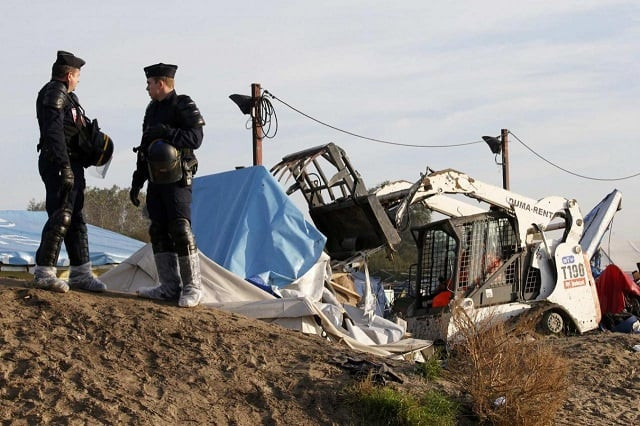In northern France, 'invisible' women migrants risk all to reach Britain
Women and girls are vastly outnumbered by men in Calais

French police secure the area as a bulldozer tears down makeshift shelters during the dismantlement of the camp called the "Jungle" in Calais, France, October 27, 2016
Photo: REUTERS
Emerging from the woods, her home for the past three months, the 17-year-old joined only one other woman and dozens of migrant men in this industrial zone to meet with volunteers and to collect shoes and winter coats distributed by charities. Despite the dismantling of the 'Jungle' camp a year ago, a squalid shanty town that housed nearly 10,000 people, charities and authorities estimate at least 700 migrants have returned to the port city and are sleeping rough in parks or forests.
Women and girls are vastly outnumbered by men in Calais, and with no shelter or tents for protection, they are vulnerable to rape, trafficking and exploitation, aid groups say. "It is very difficult. Very hard. I live here in Calais," the small-framed Eritrean said in her limited English, pointing towards the trees in the distance, where groups of young migrant men loiter and play with their phones.
For most migrants, Calais is the last stop before an attempt to cross the short sea stretch to Britain, the destination of choice for many who speak English or already have family or friends in the UK. It has become a symbol of Europe's troubles dealing with the influx of people fleeing war and poverty in the Middle East, Asia and Africa.
The sudden horns of a lorry send several boys running, eager to try their luck at making it to Britain as a stowaway - no small feat for the young and fit, let alone for Salma, who is also five months pregnant. "She's pregnant and we help her to go to the hospital to see a doctor," said Marine, a midwife treating Salma through French medical charity Gynécologie Sans Frontières (GSF). "She doesn't want to stay here," said Marine, declining to give her full name or divulge further details about the teenager, who has quietly slipped back into the forest alone.
'Pakistan Girl' takes aim at corrupt cops, domestic abuse
"Completely Invisible"
Obstetrician Richard Matis, and GSF's vice president, said he isn't sure how many female migrants are pregnant as they are constantly on the move and determined to reach the UK before giving birth, no matter the cost. "Pregnant migrants are at higher risk of delivering premature babies or even suffering miscarriages, as they are not getting regular proper checkups," said Matis. "Precarious living conditions like living in the woods with poor food and sanitation also increases the risk of infection," he told the Thomson Reuters Foundation in a phone interview.
Matis said most women and girls he has treated in the region have been physically or sexually abused. Lacking basic shelter, it is no surprise women are at risk of rape and abuse, said volunteer Ciara Connell from the Refugee Women's Centre, which provides hygiene and baby products, as well as support for women migrants in Calais and Grand Synthe.
"There's no access to toilets, showers or basic sanitation so if you're on your period, it's horrible," said Connell. "It's a very male-dominated environment. It isn't a safe place to be," she said. "They are completely invisible here."
Domestic abuse: Violence against women on the rise
Exploitation
Charities and asylum seekers said local police would regularly slash tents and forcibly evict migrants - including women and children - in the dead of night using teargas and dogs to prevent a new 'jungle' from forming. A spokesman for the French government in the Pas-de-Calais region declined to comment on the allegations of police heavy-handedness and the living conditions of migrants.
"When you're in such an open space with no shelter of any kind and no protection measures, it's an open market for these very exploitative individuals to come and do whatever they please," said Annie Gavrilescu from aid group Help Refugees, which distributes clothing and blankets to migrants in the area. The United Nations children's agency UNICEF has said women and children who rely on human smugglers to move through Europe, often under a "pay as you go system", are prone to exploitation and violence, including prostitution and rape.
Even if signs of trafficking or sexual abuse are spotted, Gavrilescu said there are no services to report these crimes to, and police distrust is rife among migrants. "We don't want to ask those questions in case we're opening up a wound that we can't help to heal in any way," she said.
"Sometimes it does more damage to ask those questions if we cannot appropriately protect them," Gavrilescu added. Though safety fears loom large, mothers like Hamin Ibrahim from Kurdistan in northern Iraq said protecting her four children, aged between three and 13, is what concerns her the most.
"We live a very difficult life here. Now it's winter, we can't bear this cold weather," she said, who has been sleeping rough in northern France for four months. "I just want to take my children to the UK and have a good future. I am very worried about them. I don't care about myself," she said.



















COMMENTS
Comments are moderated and generally will be posted if they are on-topic and not abusive.
For more information, please see our Comments FAQ